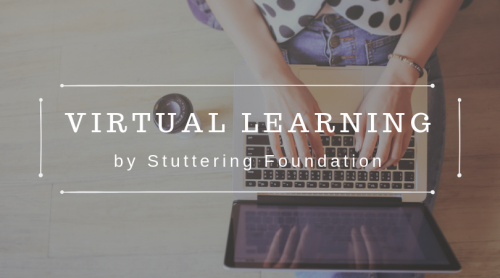
Blog by Sara MacIntyre
May 14, 2019
Last week was the launch of Virtual Learning by Stuttering Foundation, a new collaborative online workshop series that will include a variety of topics ranging from: clinical training opportunities, to parent education, to panels of people who stutter of all ages sharing their stories. We couldn’t be more excited about the possibilities, and we hope you’ll find this meaningful in your growth as a clinician, family member, and or individual who stutters.
Our first offering, “Helping Parents Foster Self-Regulation in their Children who Stutter,” was led by Ellen M. Kelly, PhD, CCC-SLP, BCS-F of Vanderbilt Medical Center—and we could not have asked for a better start! We began this series hoping the community would find value in frequent, varied topics with the opportunity to interact with presenters. We were overwhelmed with the response, and it far exceeded our expectations for the first course with over 100 participants!
Dr. Kelly’s presentation laid the groundwork for understanding "self-regulation" as a concept, explained the importance of the environment in growing a child’s self-regulation skills, and finally, provided practical suggestions for helping clinicians help parents foster this development in their children who stutter.
We learned the importance of discovering how parenting styles can play a substantial role in the positive development of a child’s self-regulation skills. Specifically, how “Authoritative Parenting,” focusing on being more responsive (nurturing, accepting, responsive to feelings), yet demanding (setting appropriate limits and boundaries, providing guidelines, and celebrating and highlighting small steps towards independence) can best support a child’s self-regulatory growth (Hoffman, Cooper, & Powell, 2017).
Throughout Dr. Kelly’s talk, she highlighted the importance of cultivating clinician-client trust in this process and provided some examples of how she may approach certain things clinically. She suggested incorporating a Palin PCI-esc, strength-based approach, to helping parents discover for themselves what things they already are doing that are helping their child. Building upon what they already do well as parents—acknowledging that they know their children the best, helps parents feel empowered rather than defeated or guilty.
The evening concluded with some fabulous participant questions that showed a high-level of reflection. Thank you so much to Dr. Ellen Kelly for kicking off our series so successfully!






 Podcast
Podcast Sign Up
Sign Up Virtual Learning
Virtual Learning Online CEUs
Online CEUs Streaming Video Library
Streaming Video Library